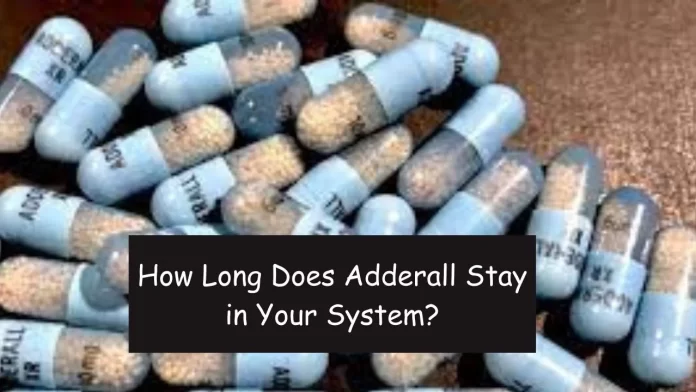Adderall is a prescription drug that is commonly used to treat attention deficit hyperactivity disorder (ADHD) and narcolepsy. It contains a combination of amphetamine and dextroamphetamine, which are stimulants that affect the central nervous system. While Adderall can be an effective treatment for these conditions, it also has the potential for abuse and can cause side effects.
One of the most common questions that people have about Adderall is how long it stays in their system. This is an important question, as the length of time that Adderall remains in the body can affect drug tests, potential side effects, and interactions with other medications. In this article, we will explore how long Adderall stays in the system and what factors can affect its duration.
What Is Adderall?
Adderall is a prescription medication that is a combination of two stimulant drugs, amphetamine and dextroamphetamine. It is primarily used to treat attention deficit hyperactivity disorder (ADHD) and narcolepsy. Adderall works by increasing the levels of certain neurotransmitters in the brain that are involved in attention, concentration, and alertness. It is classified as a Schedule II controlled substance in the United States due to its high potential for abuse and addiction. Adderall should only be taken under the guidance of a healthcare professional and according to the prescribed dosage.
How does Adderall work?
Here’s a step-by-step explanation of how Adderall works:
- Adderall is a combination of two stimulant drugs, amphetamine and dextroamphetamine, which work by increasing the levels of certain neurotransmitters in the brain.
- These neurotransmitters include dopamine, norepinephrine, and serotonin, which are involved in regulating mood, attention, and alertness.
- When someone takes Adderall, the drug is absorbed into their bloodstream and travels to the brain.
- Once in the brain, Adderall stimulates the release of neurotransmitters from certain neurons, and it also blocks the reuptake of these neurotransmitters by other neurons.
- This leads to an increase in the levels of dopamine, norepinephrine, and serotonin in certain areas of the brain, which can improve focus, attention, and alertness.
- In people with ADHD, Adderall can also help regulate activity in the prefrontal cortex, a part of the brain that is involved in executive function, decision-making, and impulse control.
Overall, Adderall works by altering the balance of certain neurotransmitters in the brain, which can improve cognitive function and help manage symptoms of ADHD and narcolepsy.
What can side effect how long it stays in your body ?
Adderall can stay in your body for up to 72 hours, depending on factors such as dosage, frequency of use, and individual metabolism.
Here are some of the common side effects of Adderall:
- Difficulty sleeping
- Loss of appetite and weight loss
- Stomach pain and digestive issues
- Headaches and dizziness
- Dry mouth
- Increased heart rate and blood pressure
- Restlessness and agitation
- Anxiety and irritability
- Nausea and vomiting
- Mood swings and changes in behaviour
It’s important to note that some people may experience more severe side effects, such as hallucinations, seizures, or allergic reactions.
What are the symptoms of an Adderall addiction?
An Adderall addiction is a condition in which a person has developed a physical and psychological dependence on the drug, and they experience withdrawal symptoms and cravings when they try to stop using it. Some common symptoms of an Adderall addiction include:
- Taking more Adderall than prescribed or using it without a prescription
- Difficulty controlling or reducing Adderall use
- Spending a lot of time thinking about or obtaining Adderall
- Continuing to use Adderall despite negative consequences, such as health problems or relationship issues
- Developing a tolerance to Adderall and needing to take higher doses to achieve the same effects
- Experiencing withdrawal symptoms, such as fatigue, depression, irritability, and insomnia, when attempting to stop using Adderall
- Neglecting responsibilities, hobbies, or social activities in favour of using Adderall
Treatment Options for Adderall Addiction
Here’s an overview of some common treatment options for Adderall addiction:
Medication-assisted treatment
In some cases, medications may be used to help manage withdrawal symptoms and cravings associated with Adderall addiction. For example, bupropion and modafinil may be used to help manage symptoms of depression and fatigue, while naltrexone can help reduce cravings.
Behavioural therapy
Various types of behavioral therapy, such as cognitive-behavioral therapy (CBT) and contingency management, can help individuals with Adderall addiction identify and change patterns of thinking and behaviour that contribute to drug use. This can help improve coping skills, reduce triggers and cravings, and promote long-term recovery.
Alternative therapies
Alternative therapies, such as meditation, yoga, acupuncture, and massage therapy, can help individuals with Adderall addiction manage stress and improve overall well-being. These therapies can also help reduce anxiety and promote relaxation, which can be helpful during the recovery process.
Family therapy
Family therapy can be beneficial for individuals with Adderall addiction, as it can help address any family dynamics or issues that may have contributed to the addiction. It can also help improve communication and relationships between family members.
Education and support
Education about the effects of Adderall and addiction, as well as ongoing support from healthcare professionals, can be helpful for individuals with Adderall addiction. This can include regular check-ins with a doctor or therapist, as well as access to resources and support groups.
Dual diagnosis treatment
Many individuals with Adderall addiction also have underlying mental health conditions, such as depression or anxiety. Dual diagnosis treatment can address both the addiction and the underlying mental health condition, which can be key to long-term recovery.
Frequently Asked Questions
Q1:How much water should I drink on Adderall?
Ans: Generally, drinking 8-10 glasses of water per day is recommended for overall health and hydration.
Q2:Can Adderall affect your skin?
Ans: Yes, Adderall can cause various skin-related side effects, including dryness, rashes, and acne.
Q.3:Do you drink coffee on Adderall?
Ans: It’s generally not recommended to drink coffee while taking Adderall, as it can increase the risk of side effects.
Q.4:How do you know if Adderall is working?
Ans: You may notice improved focus, increased productivity, and a decrease in ADHD symptoms if Adderall is working effectively.
Q5:How long does fentanyl stay in your system ?
Ans: Fentanyl can stay in your system for up to 72 hours, depending on factors such as dose and individual metabolism.




